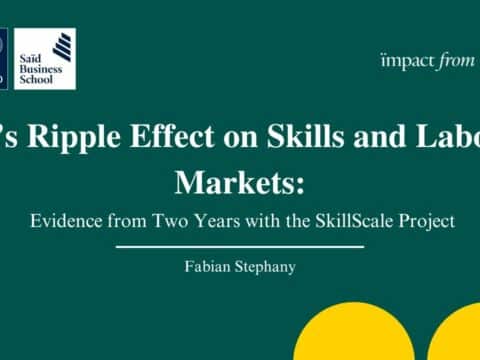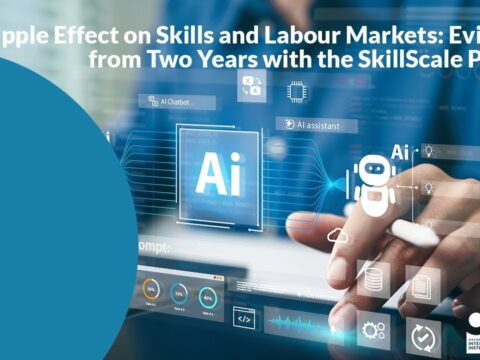

Fabian Stephany is a Departmental Research Lecturer (equivalent Assistant Professor) at the Oxford Internet Institute (OII), University of Oxford and a Senior Research Fellow with the Institute for New Economic Thinking at the Oxford Martin School. He is also a Future of Work fellow at the Brussels-based think tank Bruegel, an inaugural fellow at Microsoft’s AI Economy Institute, and a research affiliate at the Humboldt Institute for Internet and Society in Berlin. Additionally, he currently serves as a member of the World Economic Forum’s Global Future Council for Human Capital Development.
At the OII, Fabian leads the SkillScale project, which views skills as a central lens through which to understand today’s labour market transitions. By examining how work quality, job growth, and labour market equitability and sustainability respond to technological change, the project investigates how AI skills are becoming increasingly pivotal for workers and employers alike. As part of his Microsoft fellowship, Fabian is currently exploring the role of AI skills in employability—particularly how working with generative AI enhances job prospects and addresses the gender gap between men and women.
Fabian is also a co-creator of the Online Labour Observatory—a digital data hub hosted in collaboration with the International Labour Organization that provides researchers, policymakers, journalists, and the public with insights into online platform work. His research has been published in leading academic journals, such as Research Policy and Scientific Reports, and has received media coverage in outlets around the world, including The Washington Post, The New York Times, The Telegraph, Nikkei Asia, Handelsblatt, and the Frankfurter Allgemeine Zeitung.
He holds a PhD and other degrees in economics and social science statistics from European institutions, including Università Bocconi in Milan and the University of Cambridge. In addition to his academic positions, he has worked as a senior data scientist in the private sector and regularly advises international organisations such as the United Nations Development Programme, the World Bank, and the OECD.
Future of Work, Internet Economics, Network Science, Online Gig Economy, Platform Economy


This programme supports research in the sphere of AI & Work.

This project explores how the analysis of online generated labour market data can help us understand the relevance of new skills and sustainability of novel occupations.

AI technologies are increasingly being promoted to automate or augment work in the education sector. With the growth of these technologies, this project asks what tasks and skills are being affected by the adoption of AI in the education sector.

With Dr Fabian Stephany
Fabian Stephany presents the latest findings on the changing relevance of AI skills at the Oxford Future of Professionals seminar with Saïd Business School, University of Oxford.

With Dr Fabian Stephany
Watch Dr Fabian Stephany sharing key findings from his latest co-authored research which examines shifts in the labour market and the growing trend of skills-based hiring in the AI sector.

With Dr Fabian Stephany
This talk presents key findings from the SkillScale Project, a 2 year research initiative at the Oxford Internet Institute investigating how technological change and the rise of artificial intelligence are reshaping labour markets and skill demands.

With Dr Fabian Stephany and El-Iza Mohamedou
The future of work in an AI-driven world, whether these new technologies help or hurt the labour market, and what employees should be doing to future-proof their skills.

3 March 2025
New analysis from researchers at the Oxford Internet Institute examines how businesses in the UK are responding to the hiring gaps in AI-related recruitment, and whether skills proficiency commands a higher salary than a higher education degree.

17 May 2024
Dr Gemma Newlands and Dr Fabian Stephany have been named as winners of the Achievement Award at the University of Oxford 2024 Divisional Teaching Excellence Awards.

27 February 2024
2023 was the year AI really made its mark. It's been a wild ride for everyone from office workers to big companies, with even the experts scratching their heads.

24 October 2023
Researchers at the Oxford Internet Institute, University of Oxford, and the Center for Social Data Science, University of Copenhagen, find that the economic value of a skill is determined by how well it can be combined with other worker competencies.

Newsweek, 15 June 2025
There have long been concerns about Generation Z and their attitudes towards work. However, according to LinkedIn co-founder Reid Hoffman, Gen Z is "attractive" to employers for one key reason—they are "Generation AI."

Frankfurter Allgemeine Zeitung (FAZ), 21 May 2025
Artificial intelligence does not necessarily lead to higher unemployment. AI is changing job profiles, automating routine tasks, and shifting skill requirements – but above all, it is intensifying the shortage of skilled workers.

Frankfurter Allgemeine Zeitung (FAZ), 25 February 2025
Artificial intelligence replaces routine tasks while simultaneously increasing the demand for complementary human skills. The positive effect clearly prevails
This course introduces students to conceptual and methodological aspects of social science research methods, including both quantitative and qualitative methods.
This course teaches the essentials of programming in Python, using the language to access data from a diverse variety of sources on the social web, and transforming this material into datasets which are amenable to traditional social science analysis.